

Tao Te Ching
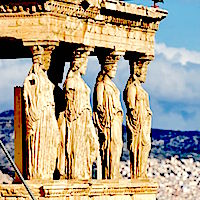
Greek (Έλληνες) Lineage
The dominance of ancient Greece was a relatively short but profound period of history when Reason temporarily won out over Faith launching the worlds of science and philosophy; appreciating rather than being afraid of doubt. This influence permeates modern Western culture and politics to such an extent that most countries today could almost accurately be described as cultural Greek colonies. A short list of these precious heirlooms of world culture include democracy and dictatorship; our systems for engineering, finance, trade, and government regulation of business; trial by jury, freedom of speech, assemblage, and worship; our universities, schools, gyms, athletics, and stadiums; the cults of health and natural living, the infatuation with physical beauty; the Christian theology including heaven, hell, purgatory, demons, apocalypse, and even most superstitions; our alphabet, language, grammar and literature; liberating science from religion, it developed atomic theory and the theory of evolution, physics, chemistry, astronomy. But perhaps our biggest inheritance is Greek philosophy that raising the status of the sage over that of the saint or warrior, initiated and examined almost every issue - from feminism to monotheism, from communism to materialism - still discussed today. Greek civilization didn’t end or die, it only migrated further throughout the world to become as Will Durant describes, “the bright morning of Western civilization… our nourishment and our life.”
Socrates (470-399 BCE): “The only true wisdom is in knowing you know nothing.”
Antisthenes (445 – 365 BCE) Founder of the “Cynic” philosophy: “I do not possess in order not to be possessed.”
Pyrrho (360 BC – 270 BCE); Founder of the Skeptic School: “Every reason has a corresponding reason against it.”
Epicurus (341 – 270 BCE); Founder of Epicurianism: “When happiness is present, we have everything; but when it is absent, we do everything to possess it.”
Zeno of Citium (334 – 262 BCE) founder of Stoicism: “The purpose of life is the happiness that can only be achieved by virtue and reason.”
People (57)
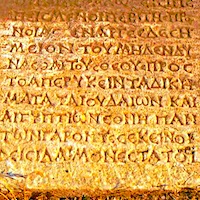
Diogenes of Oenoanda Διογένης ὁ Οἰνοανδεύς
77 – 142 CE
Great Preserver of Epicureanism
Not much is known about Diogenes' life other than that he had a summary of Epicurus' philosophy carved onto a 2.37 x 80 meter wall. Originally taking up 260 square meters of wall space and including c. 25,000 words, now only about a third of it remains. That was enough though however to preserve a good sense of Epicurus' teaching on ethics, physics, and other fields. A close disciple, Diogenes felt that these teachings helped him immensely and he wanted to assure their survival and the ease for as many as possible to read them.

Demeter (Ceres)
c. 2500 BCE
Eleusinian goddess, discoverer of agriculture
“Where smoke, there’s fire” and where a god or goddess, probably real people beginning the symbolism. Like Shennong in China, the Greeks credited Demeter with the discovery of agriculture and like the Chinese Nüwa as the transition from matriarchal to patriarchal society. Assuring fertility with mystic rites and social order as "Law-Bringer;” she predates the Olympian pantheon and with her daughter Persephone is central to the Eleusinian Mysteries, a holy, psychedelic communion celebrating birth, death, and resurrection giving (along with the Egyptian belief in immortality) to Christianity a “weapon with which to conquer the Western world” (Durant).
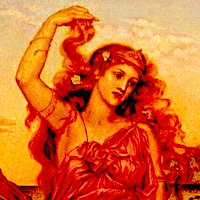
Semele Σεμέλη
c. 2000 -1970 BCE
Early Greek Virgin Mary
Early prototype for the Virgin Mary, “earth mother,” daughter of Cadmus, the first Greek hero, founder and first king of Thebes; Semele gave birth to the early Jesus-figure, Dionysus who was born on December 25th, changed water into wine, was the son of god and a mortal woman, died and resurrected after 3 days. Worshipped by the Athenians, in Roman mythology, she became the goddess Stimula, in Neoplatonic philosophy she personified “intellectual imagination,” and during the Enlightenment became a popular theme for operas. Incinerated because of seeing too deeply into the nature of a god, she represents the Icarus-principle of hazards from too much of a good thing.
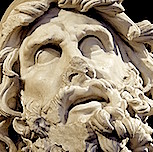
Odysseus Ὀδυσσεύς (Ulysses)
c. 1100 BCE
Trickster lineage hero and symbol
Cultural hero to the Greeks and respected for his cunning and strategy, Odysseus was reviled by the Romans as deceitful and without honor for not maintaining strict adherence to rules and ‘duty.’ Christians dismissed him and Dante relegated him to the lowest level of hell. He became a legendary Greek king and hero of Homer’s The Odyssey and a powerful symbol in the Trickster lineage. Stories of his successful guile, his brilliant solutions to problems, his courageous willingness to—for a good cause—go beyond conventions, norms, and chauvinistic beliefs for the greater good. Representing cultural themes long before Homer personified the Odysseus archetype, this imagery continues in the modern world in works by Tennyson, Kazantzakis, James Joyce, Virginia Woolf, Margaret Atwood, Susanne Vega, and the Coen brothers.

Homer
850 BCE - ?
Primogenitor of Western culture
Called by Plato the “first teacher” and "leader of Greek culture,” Homer spread an immense influence over all Western culture. A blind bard prophet, his books the Iliad and Odyssey represent the first European literature as well as one of the main influences that shaped Western culture. The “Greek Bible,” these books taught the best behavior for almost any situation with true and timeless images of human goodness and wisdom. Describing the most enduring legends known to the Western world, these universal themes inspire and enlighten.
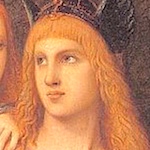
Hesiod
846 – 777 BCE
“History’s first economist”
Called “history’s first economist,” farm hand, singer, epic poet of the people; Hesiod used his poetry to paint and establish religious customs, Greek mythology, good farming practices, and a foundation for the poor to overturn the injustices and inequality of the kings and aristocracy. He protested against injustice, furthered the understanding of astronomy and time keeping, the economics of sea trade, and gave meaningfulness to creativity and hard work. While Homer extolled the hero, the rich and powerful; Hesiod championed the working classes and the common person (though not women).

Orpheus /ˈɔːrfiəs
7th century BCE
"Greatest poet and musician of all time"
Accepted by most ancient sources as a real person but also shrouded in myth and legend, Greeks venerated Orpheus as the greatest poet and musician of all time believing his music could charm animals, divert rivers, and even make rocks and trees dance. As prophet, musical archetype, and founder of the Orphic mysteries; his influence on art, poetry, film, opera, music, and painting continues into modern times. As well as influencing Stoic pantheism and the Neo-Platonists’ asceticism; he continued a mystic cult migrated from Egyptian Osiris that included the suffering, death, and resurrection of a divine son; judgments at death of heaven, hell, or purgatory; “original sin,” and a communion sacrament of eating a god’s body and blood; it became a basis for the Christianity flourishing today.
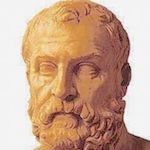
Solon
638 – 558 BCE
Founder of Athenian democracy
Poet, statesman, lawmaker, one of the Seven Sages of Greece and known for establishing the foundations of Athenian democracy; Solon wrote poetry and helped stop the decline in ancient Athens. At that time, not being able to repay a debt meant slavery - first of your children, then your wife, and finally yourself. As much as 92% of all Athenians were slaves. A skilled compromise negotiator, and respected for his wisdom and fairness, Solon was given power to change this. Establishing publicly funded brothels "democratize" the availability of sexual pleasure, he cancelled debts and contracts, freed slaves, and ended the causal system. This along with his beneficial trade legislation and standards resulted in an economic revival, a new golden age, and the beginning of democracy.
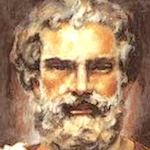
Thales of Miletus
624 – c. 546 BCE
“Father of Philosophy”
One of the “Seven Sages of Greece,” called the founder of Western Science and “Father of Philosophy,” Thales traveled to Egypt and studied with an Egyptian priest. He then returned to become ”the first Greek mathematician,” history’s first to use geometric deductive reasoning, to have a mathematical discovery attributed, and becoming the first to explain nature without myth or superstition, he set the direction for the golden age of Greek philosophy. Wanting to prove the practicality of philosophy and science, he applied it to business creating the first instance of using options and futures and to politics stopping a battle by predicting an eclipse.
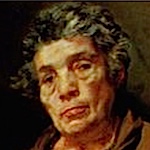
Aesop
620 – 546 BCE
Hero of the oppressed and downtrodden
Known as a strikingly ugly slave who by his cleverness became free and an adviser to kings and city-states, some historians believe Aesop was a black from Ethiopia and became Uncle Remus in the Cherokee, Algonquin and American slave tradition of Br'er Rabbit. In many cultures he symbolizes a hero of the oppressed, disadvantaged and downtrodden who with wisdom and understanding outsmarts and wins over the rich and powerful. Famous throughout the world - from China to Africa, from Europe to Japan, from ancient times until today; Aesop’s fables and sayings remain a profound influence of goodness and insight.

Sappho
612 – 570 BCE
“The Poetess” and most famous Greek woman
The most beautiful singer of her age, a political force when only 19, one of the great “Nine Lyric Poets” of ancient Greece, called by Socrates, “The Beautiful,” by Plato the Tenth Muse, and “the Poetess” by all the Greek world; Sappho is the most famous Greek woman. In fear of her pen, politicians banished her twice and her poetry continued to inflame autocratic leaders for centuries – even Medieval Church leaders in Rome and Constantinople tried to burn all her 9 volumes of poetry in 1073 and remaining scraps of these weren’t found until 1897, some not until 2014. She started history’s first “finishing school” for girls and lived “laughing love’s low laughter… lost in the love trance."
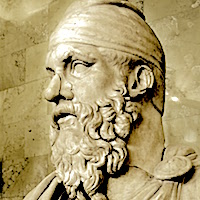
Abaris Hyperboreios βαρις Ὑπερβόρειος
595 – 595 BCE
Legendary sage, Mongol shaman, and catalyst for the beginning of Western Civilization
Abaris Hyperboreios, Skywalker βαρις Ὑπερβόρειος (c. 595 BCE)
Legendary sage, Mongol shaman, ancient ambassador of Eastern Wisdom to the West, “master of incantations,” and “Overcomer of Obstacles;” One of the earliest druids, Abaris became a famous and greatly respected sage in pre-Socratic Greece. Plato described him as a great physician who healed both body and mind, Herodotus depicted him as a magical arrow traveler, and anecdotes written by Pindar, Iamblichus, Pausanias, and Suidas characterized him as sorcerer, prophet, shamanistic missionary, purifier and bringer of balance to the earth. Peter Kingsley links him to the early formation of Tibetan civilization as well as being the soul-brother of Pythagoras, the spark that lifted the Greeks out of their primitive state, and the catalyst for the beginning and momentum of Western Civilization.
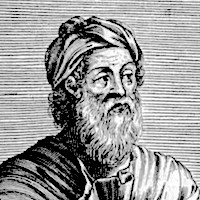
Xenophanes Ξενοφάνης ὁ Κολοφώνιος (Xenophanes of Colophon)
570 – 475 BCE
Nomad, belief-system critic, poet, and highly influential but greatly under-appreciated pre-Socratic Greek philosopher; Xenophanes traveled for 67 years teaching, "making enemies," and challenging traditional Greek values like athleticism and belief in anthropomorphic gods. Plato used many of his ideas in the Republic III, Aristotle deprecated him but then advanced many of his ideas when he wrote Metaphysics. Xenophanes realized early how stuck to tradition most contemporaries become and consciously wrote for future generations he believed (correctly) would be more open to his ideas.
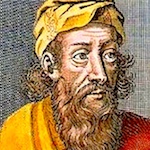
Pythagorus (of Samos)
570 – 495 BCE
"The most influential philosopher of all time"
The ancient Greeks called Pythagoras “the philosopher.” He discovered the numerical relationship between musical notes, the “music of the spheres,” gave geometry its main form, the Pythagorean theorem, and the name cosmos to the world. An elemental influence on Plato (The Republic considered based on the vegetarian, communistic community Pythagoras established) and the first to teach that the world is round and revolves around the sun, his influence extends to all of Western philosophy, Freemasonry, Rosicrucianism, mathematics, architecture, sculpture, art and music. Bertrand Russell considered him the most influential philosopher of all time.
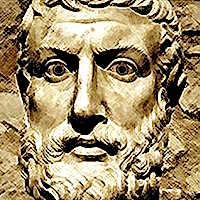
Parmenides
540 – 450 BCE
Grandfather of Western philosophy
Parmenides of Elea Παρμενίδης ὁ Ἐλεάτης (c. 540 - 450 BCE)
Father of Western logic, grandfather of Western philosophy, major influence on the development of science, promoter of the most paradoxical (contrary to appearances) vision of reality, and venerated by Plato and Aristotle; Parmenides taught that our experiences of “reality” are illusory, that the profound oneness of life makes change impossible, existence timeless, and that nothing either dies or is born. In The Way of Opinion, he explains the world of appearances, in which one's sensory faculties lead to conceptions which are false and deceitful. In The Way of Truth, he describes a mystical experience of absolute, unborn reality. These categories parallel our theme of “the words or the sense.”
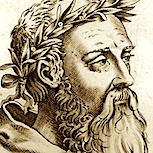
Heraclitus Ἡράκλειτος (of Ephesus, the "Weeping Philosopher")
535 – 475 BCE
A Greek Buddha
Lonely, self-taught wisdom pioneer who like the Buddha abdicated his inherited kingship; Heraclitus also like the Buddha stressed the ever-present quality of impermanence and change, the importance of humans waking up from unconsciousness, and the unity of opposites. Devoted to the principle of inscrutability, he was known as "the Obscure" and wrote only for the wise and not “the rabble.” Born just 28 years after the Buddha, he emphasized the central Buddhist doctrine of impermanence and is famous for his quote, "No man ever steps in the same river twice.” Also contemporary with Lao Tzu, he mirrored the teaching of yin and yang regarding the soul as being a mixture of fire and water, light and dark.
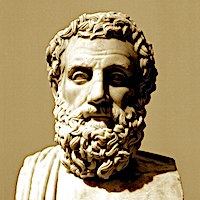
Aeschylus Αἰσχύλος
525 – 455 BCE
The Father of Tragedy
Although Aeschylus was the first to present plays as trilogies, the initiator of many theatrical innovations, and the “father of tragedy;” his Greek epitaph didn’t mention his plays, only his military roles. Although not fully acknowledged in ancient Greece, his influence has seeped through history and into the present as an inspiration for Wagner, Milton, the Romantics, Eugene O’Neill, and Robert F. Kennedy who claimed him as his favorite poet who he quoted in a speech to African Americans after Martin Luther King’s assassination. This same quote—“to tame the savageness of man and make gentle the life of this world”— became inscribed on Kennedy’s memorial after his own assassination. Aeschylus’ costumes and performances were so vivid that they were said to cause children to faint, men to urinate in their robes, and pregnant women to go into labo
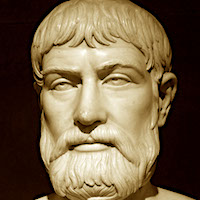
Pindar Πίνδαρος
522 – 443 BCE
Archetype of poetry
One of the always-praised but almost never-read writers, Pindar wasn’t even popular during his lifetime though he was sought out and paid high sums for eulogies. Although only a small fragment of his odes remain and none of his music and dance displays; enough of the creative artistry and complex, beautiful structures survive to give Pindar an immortal place in world literature. He became popular again during the Byzantine Era and again when his style was emulated for the revived 1896 Olympic Games, the Athens Olympics in 2004, and the London Olympics in 2012. Horace thought anyone trying to imitate Pindar would be like Icarus, sure to fail. The splendor of his imagery, imagination, and style have brought some modern scholars to regard his work as “an archetype of poetry.”
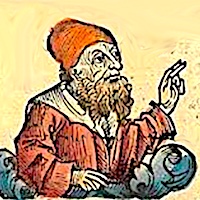
Anaxagoras Ἀναξαγόρας
510 – 428 BCE
“The Copernicus and Darwin of his age”
An heroic philosopher and scientist in a time with few scientific instruments but remarkable scientific discoveries, Anaxagoras introduced the concept of Cosmic Mind, correctly explained eclipses and why the moon shines, theorized about meteors, thunder, rainbows, the sun, and stars. He developed an insightful theory for the evolution of animal and human life and helped create the foundation for Greece’s most lasting scientific insight, the atomic understanding of matter. Immortalized in literature, he became a character in Goethe’s Faust and was quoted by Socrates, Plato, Seneca, Marcel Proust, and Gore Vidal. His genius was not always appreciated though. Dante placed him in Limbo (the First Circle of Hell) and he was sentenced to death because of teaching that the sun is a mass of fire instead of a god.
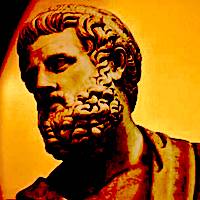
Sophocles Σοφοκλῆς
497 – 405 BCE
“The Wise and Honored One”
Author of 120 plays, known as “The Wise and Honored One,” most popular Athenian playwright for 50 years, champion wrestler, poet, musician, actor, politician, general, and priest; Sophocles initiated pioneering innovation in the presentation of drama including an emphasis on inner, psychological character development. Strikingly handsome, athletic, enriched and privileged by his family’s wealth from selling weapons during the Persian wars; Sophocles ironically developed a dark pessimistic fatalism. He ranked the unborn as the most blessed and those who die at birth next. His play, Oedipus Tyrannus became the most famous of all Greek dramas. Brought to court by a son fearful that he would bequeath his wealth to an illegitimate son from a prostitute, Sophocles defended himself by reading from a play. This not only won the case but garnered the honor of the judges escorting him home.

Pericles
495 – 429 BCE
Disprover that all power corrupts
One of the greatest statesman and leaders in all of history, Pericles disproves or is at least an exception to the adage “power corrupts.” Though not without critics (including Plato); as general, politician untainted by corruption, orator and philosopher, he helped establish a Greek golden age, increased the power of democracy, and made Athens famous as the educational and cultural center of the ancient world. He also started projects that built most of the surviving structures on the Acropolis including the Parthenon.

Protagoras
490 – 420 BCE
“The wisest man alive”—Socrates
Born poor and laboring as a porter, Protagoras was called by Socrates “the wisest man alive” and became a friend of Pericles, so respected that Plato wrote a book about him, and a philosopher so original that he started a thought revolution in ancient Greece with his theory of relativism. This led to an agnosticism that furthered science but aroused enough anger to expel him from Athens and have all copies of his books burned in the marketplace. His still famous statement that "Man is the measure of all things” continues his influence and his saying, “There are two sides to every question” has become a truism and idiom in most languages.
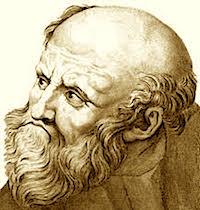
Empedocles
490 – 430 BCE
"The father of rhetoric"—Aristotle
Empedocles Ἐμπεδοκλῆς (490 – 430 BCE)
Brilliant orator, physician, poet, vegetarian, magician, pre-Socratic Greek philosopher, and called by Aristotle the father of rhetoric; Empedocles, according to Kingsley, “brought the germs of a new civilization into existence” and became a foundational researcher who set the stage for Euclid and the other early scientists. Also a highly successful politician who helped over through tyrannical and oligarchic governments but then declined offered sovereignty, he was the last Greek philosopher to write in verse. First in the west to describe the four classical elements, he taught the first comprehensive theory of light and vision, anticipated Darwin's theory of natural selection, and believed that all living things reincarnate between humans, animals and plants. Said by Pliny to have traveled to the east and studied with the Magi, Empedocles explained how limited and narrow our perceptions remain while our concepts fool us into believing we understand the whole, how we believe the words without insight into the sense.
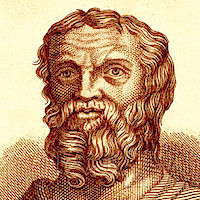
Herodotus Ἡρόδοτος
c. 484 - 425 BCE
“The Father of History”
“The Father of History” and first known historian to systematically collect and investigate facts, Herodotus described the purpose of his efforts “to prevent the traces of human events from being erased by time, and to preserve the fame of the important and remarkable achievements.” While the accuracy of his accounts is often questioned, he worked hard to corroborate his stories. From an internationally-minded port city and widely traveled, he describes many of his accounts from an eye-witness perspective. With an overarching theme of civilizations in conflict, he collected oral histories during his travels, thought about their meanings and interpreted them. Not only reporting on ancient science, he also speculated on scientific, cultural, geographical, and historical questions. His role in bringing ancient wisdom into modern understanding is immense.
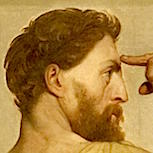
Phidias
480 – 432 BCE
Greatest Greek Sculptor
Greatest Greek sculptor, fashioner of the 43’ Statue of Zeus at Olympia (one of the Seven Wonders of the Ancient World), and close friend to Pericles; history credits Phidias with the development and design of Classical Greek sculpture. He supervised and helped create the great works on the Acropolis in Athens, designed the statues of Athena inside the Parthenon that had 2345 lbs of gold on just the robe, and a colossal bronze Athena Promachos, symbol for Athens and goddess of wisdom. His work was described as “the most beautiful images on earth,” all who could afford it made pilgrimages to it, and hundreds of years later a Roman author described his work as an addition to religion “equal to a god.”
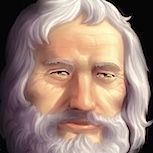
Euripides
480 – 406 BCE
Ancient humanitarian influence continuing today
Radical influence for the good, for equality, compassion, and understanding; Euripides became the best playwright of all time actively fighting against oppression, inequality, superstition, and war. He depicted the gods of his time as childish fantasies, women as the best civilizing force for men, ancient heroes as ordinary people, and sympathy as the best attitude toward all victims of war and social inequalities. Frequently shocking the status quo, he became the foundation for ancient education and the greatest ancient intellectual Greek inspiration, a force that continued through history, inspired the 18th and 19th century humanitarianism, and continues today.
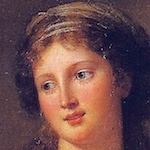
Aspasia
470 – 400 BCE
A female Socrates and dramatic influence on Western culture
An hetaera, a highest class courtesan who – unlike most women of the time - was highly educated, independent, and able to participate in public life, Aspasia became Pericles’ mistress and a dramatic influence on Greek politics, philosophy and culture. Her home was an intellectual greenhouse attracting the greatest thinkers of the era and her teachings influenced Socrates, Plato, Xenohon, and many more. Intelligent, beautiful, charming, and called a "female Socrates;” she taught realization through self-knowledge and although a prostitute, her advise was so respected influential Athenians brought their wives to hear her.
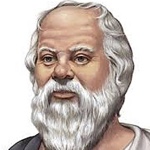
Socrates
469 – 399 BCE
One of the most powerful influences on Western Civilization
A founder of Western philosophy, Socrates’ immense influence, methods and insight challenged conventions and encouraged a simple way of life. His lineage continued through Plato, Aristotle, Alexander the Great and some of his other students began important schools of philosophy like Cynicism and Stoicism. Famous for developing the Socratic Method still used today and which could be considered a way of moving from understanding the words to understanding the sense; Socrates became a profound influence on the Roman empire, medieval Europe, the Islamic and Judaic Middle East, the Renaissance and the Age of Reason in Europe. Through more modern philosophers like Locke, Hobbes, and Voltaire; Socrates stays with us today.
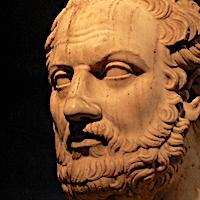
Thucydides Θουκυδίδης
460 – 400 BCE
"Father of realpolitik"
General, Athenian historian, and "father of "scientific history;" Thucydides wrote one of the world's most influential books, History of the Peloponnesian War. The United States Founding Fathers—ironically because he hated democracy—used him as a guide for their proposed decision making process. Still studied in military colleges and universities, his theories, analysis of historical events and international relations help explain the cycles of human nature interacting with war, plagues, and other various crises. Along with Hobbes and Machiavelli, a founding fathers of political realism, he focused on understanding the cause and effect of events but also believed that history is too irrational to predict.
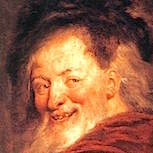
Democritus Dēmókritos
460 – 370 BCE
Father of modern science and greatest of ancient philosophers
The "father of modern science,” famed for his atomic theory of the universe, mathematics and geometry pioneer, called by Francis Bacon “the greatest of ancient philosophers;” the famously cheerful Democritus was born into a very rich family but spent almost all his money becoming in his era the most widely traveled going as far as Ethiopia, Persia, and India where he is said to have been exposed to and influenced by Buddhism. Returning without wealth, he devoted himself to a simple life of philosophy, science, music and art creating an influence still with us today.
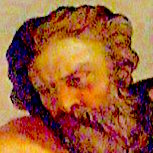
Antisthenes
445 – 365 BCE
Creator of a religious tradition without religion
Founder of the “Cynic” philosophy (named after the place he taught, Dogfish), student of Socrates and with him when he died, plagiarized by Plato, and teacher to Diogenes who made his teachings famous creating a “religious order without religion;” Antisthenes taught that the wise follow the sense and not the words, virtue instead of laws, insight instead of memes. Criticizing belief in universals, he questioned taking fame, fortune, pleasure and power as life priorities and modeled the value of a simple life in harmony with nature setting the stage for the early Christian ascetics. Dressing in the most common and worn clothes, he refused any pay for his teachings and preferred poor students.
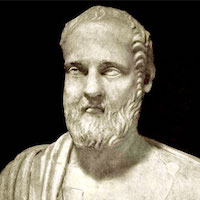
Isocrates Ἰσοκράτης
436 – 338 BCE
Greece’s most famous orator, rhetoric and philosophy school founder, teacher of kings and other teachers; Isocrates promoted a vision of all the Greek city-states being part of one common nation. This established a foundation for the Panhellenic union, the defeat of Persia, Alexander’s unification and conquests. Cicero compared the school he founded to a Trojan Horse because the ideals it promoted were so able to subtly and effectively infiltrate the culture and politics of the times. Historians attribute much of the famous integrity, honesty, and truthfulness of ancient Athens to Isocrates. A strong voice for peace, he stressed how peace doesn’t create more pain and suffering for populations while war creates so many disasters. Criticized by Plato but praised by Socrates, Isocrates became an important influence on establishing liberal arts education.
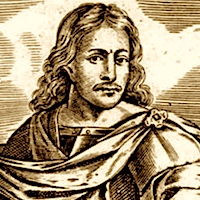
Xenophon of Athens Ξενοφῶν
(430–354 BCE)
General, Socratic biographer, philosopher
Much like Plato, Xenophon was a student and biographer of Socrates. These two biographical descriptions (the only surviving examples of contemporary Socratic dialogue) differ widely however sparking an historical debate about what Socrates was really like. Bertrand Russel wrote that Xenophon “was not very liberally endowed with brains and on the whole conventional” (Others though like Montaigne, Rousseau, and Benjamin Franklin praised his intellect.) but also “the excellence of Plato as a writer of fiction throws doubt on him as a historian” so obscure mystery must remain surrounding Socrates. As a Greek general, historian, mercenary, as well as philosopher; Xenophon’s approach and descriptions reveal the more pragmatic and political view.
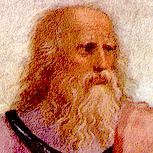
Plato Πλάτων
428 – 348 BCE
Founder of the Western world’s first and longest-lived university, one of the most influential philosophers in all history; Plato used the influence of his teacher Socrates, the skill of his student Aristotle, and his own personal genius to establish the foundation of Western science. Founder of process philosophy, Alfred North Whitehead described all of European philosophy as “footnotes to Plato.” Nietzsche described Christianity as "Platonism for the people" and Christianity is indeed infused with Platonic thought that also profoundly influenced Saint Augustine, one of the most respected Christian philosophers. Platonic thought has continually revived through the ages dominating the Middle Ages, inspiring th Renaissance, and continues as a profound influence today.
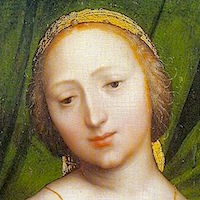
Lais of Corinth
fl. 425 BCE
Described by Athenaeus as “superior in beauty to any woman that had ever been seen,” Lais typifies the Greek penchant for blending philosophy with prostitution. Although so desirable would-be clients would offer her all their wealth and possessions for a single night; she was so wealthy she would often refuse the most lavish offers. Her love of philosophy led her to offer herself to philosophers like Diogenes for a wee bit and gave the ugly Demosthenes great honor and fame by offering him 10,000 drachmas for an evening. She used her great wealth for the common good helping worthy people and building public structures and temples. Honored with a great tomb when she died, Lacroix described her as “the greatest conqueror that the Greeks have ever known.”
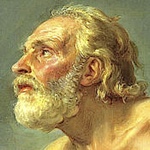
Diogenes (of Sinope)
412 – 323 BCE
Exiled from his place of birth, Diogenes lived as a citizen of the world begging for food and sleeping in a big ceramic jar. Carrying a lamp during the day “looking for an honest man,” he publicly ridiculed Alexander the Great, sabotaged and embarrassed Plato, and was sold into slavery after being captured by pirates. He developed Cynicism and teachings that became Stoicism, one of the most influential philosophies of Greek culture. He criticized the artificialities of society and advocated simplicity and a return to nature. Referencing him in their works, he inspired many great literary figures including Chekhov, Blake, Goethe, Dostoevsky, Cervantes, Charlotte Brontë and Charles Dickens. Called by Plato ”Socrates gone mad,” his poetic spirit and lifestyle continued through the ages, manifested in modern times by people like Charles Bukowski, and embodied in stories like Jack Kerouac’s On the Road.

Demosthenes Δημοσθένης
384 – 322 BCE
Orphaned at the age of seven, called “blazing thunderbolt,“ read more than any other ancient orator, and one of the 10 greatest ancient Greek speakers; Cicero said Demosthenes was “the perfect orator” who “stands alone among all.” Self-taught by studying famous speeches and overcoming a serious speech problem by speaking to the sea with pebbles in his mouth; he used his prodigious skills to influence political sentiment attempting to keep Athens free and independent. His group of paid orators were considered one of the least respected professions and presaged the lawyers and professional politicians of our time. He sometimes prepared arguments for both sides in a case and became rich supporting unethical positions he didn’t believe in but wound up suffering and dying for views he was paid to defend. Though exemplifying both the best and worst of the legal profession he helped spawn, he inspired The Federalist Papers, the French Revolution orators, Henry Clay, and Friedrich Nietzsche.
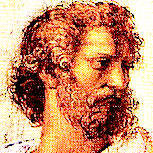
Aristotle Ἀριστοτέλης
382 – 322 BCE
Famous student of Plato and teacher of Alexander the Great, the first to organize a group to do scientific research, to systemize Western philosophy, to formalize a system of logic and to develop a theory of evolution; Aristotle is considered "The First Teacher" by Muslims and a profound influence on Judaism and Christian theology that extended through the Renaissance and continues today. Though only about one third of his writings remain and much more a proponent of the words rather than the sense, Cicero described him as "a river of gold,” Dante as “the master of those who know,” and through 1500 years of European history, “the philosopher.” He taught virtue as the secret of happiness, politics as the art of compromise between classes, and politically creating a balance between faith and reason, equality and freedom.
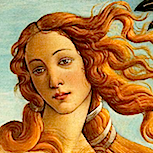
Phryne
371 - c.310 BCE
Model for the most famous sculptor of the time, Praxiteles and the first life-size statue of the nude female form; Phryne’s habit of letting down her hair and swimming naked in the sea during Elusion festivals inspired Apelles’ famous painting of Aphrodite as well as Botticelli's famous Birth of Venus. Her success as a hetaira courtesan made her so rich she was said to offer funding to rebuild the walls of Thebes destroyed by Alexander the Great if the words "Destroyed by Alexander, restored by Phryne the courtesan" were inscribed on them. Apparently too much to ask, this led to a charge of “impiety” at a trial where she was vindicated and found not guilty after baring her breasts.
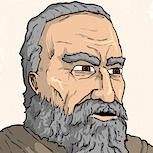
Pyrrho
360 – 270 BCE
Father of the skeptic school of philosophy, painter influenced by Democritus into philosophy, and venerated high priest of Elis; Pyrrho travelled with Alexander the Great to India, met Magi and Eastern wise men who inspired his philosophy and lifestyle. Learning some Buddhism, he brought the Three marks of Existence teachings (suffering, impermanence, and egolessness) into the West and taught that for every statement, it’s opposite can be proposed with equal justification. A huge influence on the modern skepticism of Descartes, he was so respected and appreciated in his own time that philosophers were made exempt from taxation.
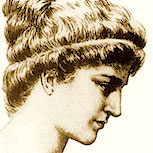
Hipparchia ππαρχία (of Maroneia)
350 – 280 BCE
Cynic philosopher and the only women on Diogenes Laërtius' list of eminent philosophers, Hipparchia influenced Zeno's views on love and sex, on the founding of Stoicism. She fell in love with her teacher, the most famous Cynic of the time, Crates; and going against her parents, married him to live a street-life of poverty. Going far beyond what was considered acceptable for women, she wore men’s clothes and living on equal terms with her husband became a symbol for rejecting conventional values and thinking for yourself. Rejecting the conventional roles for women in favor of philosophy, she left her rich family, became a beggar, consummated her relationship with Crates in public, and with him epitomized unwavering fidelity and deep affection.
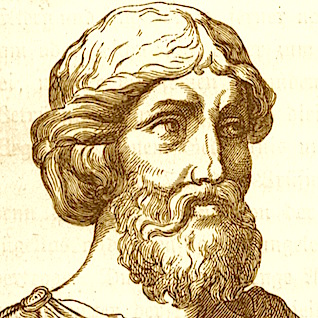
Epicurus ɛpɪˈkjɔːrəs
341 – 270 BCE
Western Buddha
Author of 300 lost books, a huge influence on western philosophy through Schopenhauer, Nietzsche, Karl Marx, David Hume, and inspiration for Thomas Jefferson’s “all men are created equal and endowed with certain unalienable rights, such as life, liberty, and the pursuit of happiness;” Epicurus blended the wisdom of pleasure with the pleasure of wisdom (Durant) and fostered equality and freedom welcoming into his school without prejudice slaves, different races, women, and courtesans. “Unsurpassably kind” to everyone, with many parallels to Lao Tzu, Epicurus taught that the purpose of philosophy is to free us from fear and suffering, to guide us to happiness.
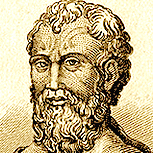
Zeno Ζήνων ὁ Κιτιεύς (of Citium)
334 – 262 BCE
Self-made wealthy merchant, shipwrecked and impoverished Phoenician, founder of Stoicism - a kind of reformation of Epicureanism that had corrupted from the pursuit of happiness to the pursuit of pleasure; Zeno emphasized virtue and goodness as essential to true happiness and peace of mind. An internationalist wanting to break down all national and racial barriers with no nations, classes, rich or poor, he defined vice as the rejection of reason making happiness impossible. Crediting Socrates, he defined the universe as god and acting on hope and fear, seeking pleasure or avoiding pain as the negative impulses causing suffering. His Stoic philosophy remained dominant for c. 800 years, influenced Seneca, Epictetus, and Marcus Aurelius. A major crater on the moon is named after him.
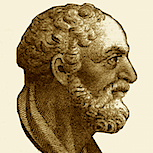
Arcesilaus Ἀρκεσίλαος
316 – 241 BCE
Founder of the Greek Middle Academy and the first to adopt Academic Skepticism doubting the ability of the senses to discover truth, Arcesilaus debated against the Stoic belief that reality can be known with certainty. He didn’t doubt that “truth” exists, only that it could be confined in concepts. This led to an emphasis on practical life like in the Zen tradition (“chop wood, carry water”) with a disregard for speculation, superstition, and belief systems; an emphasis on moderation; and an early appreciation and respect for a philosophy of doubt (though he was accused by Pascal of becoming a dogmatist in later life - a testament to the power of herd instinct and the desire to belong above creativity and openness).
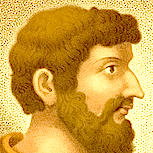
Callimachus Καλλίμαχος
310 – 240 BCE
Apostle of creativity and individuality, Callimachus suggested we "abhor all common things.” Descended from the first Greek Royal family that reigned in Africa, he was one of the first critic-poets and led the trend of rejecting the Homeric epic style in favor of epigrams and short poems. A major influence on Ovid and Latin poetry in general, he invented for libraries what may have been the first bibliographical survey that listed, categorized, and identified where literary works could be found. Teacher to Eratosthenes, he wrote one of the earliest love stories in all literature with a theme since retold by millions of poets and novelists.
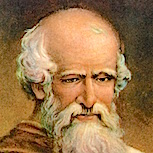
Archimedes (of Syracuse)
287 – 212 BCE
Considered the greatest mathematician of ancient times and one of the greatest of all times, Archimedes was also an inventor, astronomer, and engineer frequently called ”superhuman" by Galileo. Some of his inventions include the block-and-tackle pulley system, the odometer, a way to find the value of π, the measurement of a circle and a sphere, the making of a planetarium, and the system of exponents for expressing large numbers. His formulations for uses of the lever and balance remained without improvement until 1586 CE. Featured on postage stamps issued by Germany, Greece, Italy, Nicaragua, San Marino, and Spain; his exclamation “Eureka!” while running naked through the streets of Syracuse after discovering the principle of displacement is the state motto of California.
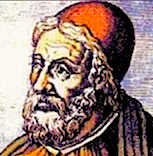
Eratosthenes ρατοσθένης (of Cyrene)
276 – 195 BCE
Chief librarian of Alexandria, student of the best teachers of his age: the Stoic founder Zeno, the first serious academic Stoic Arcesilaus, the famous poet Calimachus, and grammarian Lysanias; Eratosthenes invented geography (his terms still used today), made the first Western map of the world including parallels and meridians, calculated the circumference of the Earth and the tilt of its axis for the first time, invented leap day, accurately measured the distance from the Sun to the Earth, and founded “scientific chronology.” The first geographer to mention the Chinese, he criticized the Greek chauvinism of describing foreigners as barbarians and recommended judging people as individuals instead of as members of religious, cultural, or national groups.
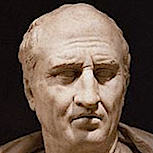
Philodemus Φιλόδημος (of Gadara)
110 – 35 BCE
Innovative philosopher-poet, student of Epicures and Zeno, first generation Epicurean, praised by Cicero, and a big influence on Horace; Philodemus was originally most well known for his poetry. However since 1738 when the ancient papyrus scrolls of Herculaneum were discovered under lava flows from Mt. Vesuvius that also destroyed Pompeii and with the help of x-rays and computers in recent years, his influence was discovered to extend to music, history, ethics and theology.

Plutarch (Lucius Mestrius Plutarchus)
46 – 120 CE
Teller of tales and distiller of wisdom, philosopher, magistrate and Delphic priest; Plutarch was frequently paraphrased and quoted by Shakespeare. Ralph Waldo Emerson called his writings "a bible for heroes,” Montaigne's Essays include over 400 references, and he was admired by Boswell, Ben Jonson, Alexander Hamilton, John Milton, Louis L'amour, Francis Bacon, and Robert Browning. An example of Mencius’ sage whose words and actions cause the stupid to become wise, Plutarch remains an enormous influence on world literature as well as an example of finding meaning, inspiration, and profound lessons from experiences and events.
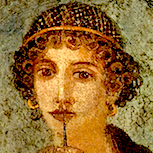
Hypatia
350 – 415 CE
Greek female philosopher, physicist, astronomer, mathematician, and head of a Neoplatonic tradition living and teaching in Egypt; Hypatia was known as a symbol of virtue even by many Christians who thought of her as far above the other philosophers of her own time. Considered the first famous "witch" tortured by Christians whose leader was later sainted, historians mark her murder by this mob as the end of Classical antiquity, the downfall of Hellenistic philosophy. Famous through history and referred to by historians, philosophers, feminists, scientists, and novelists; she is still popular today and associated with names like Marcel Proust, Carl Sagan, Umberto Eco, Dr. Who, and modern movies like Rachel Weisz’s 2009 Agora.
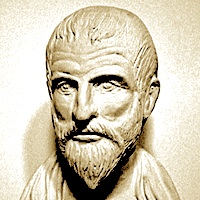
Proclus Lycaeus Πρόκλος ὁ Διάδοχος
412 – 485 CE
"The most influential Ancient Greek philosopher you've never heard of"
Proclus synthesized Greek philosophy into one system, developed Neoplatonism to its height, and became an important influence on Western medieval philosophy as well as philosophy as a whole. He believed that Plato was divinely inspired and wrote extensive commentaries. He described philosophy as a primary method for raising consciousness above materialism and as a step toward “unification with the One.” With insight into the process of discovering the meaning beneath the sense, he advocated using words to see through the limitation of words and to discover the deeper reality. An inspiration for Ralph Waldo Emerson and the New England Transcendentalists, he taught the Platonic emphasis on “the One,” “Intellect,” and the “Soul.”
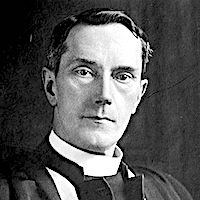
Dean Inge
1860 – 1954 CE
Christian mystic and philosopher
Although a prolific writer of 35+ books and nominated 3 times for the Nobel Prize in Literature, Inge isn’t a very well known historical figure. His insight, however, was deep and his influence on modern—at least Christian—culture profound. Author, priest, professor of divinity, passionate animal rights supporter, and Dean of St Paul's Cathedral; he criticized the Roman Catholic Church, disapproved of democracy, promoted nudity and eugenics. A serious, preaching Christian but on the mystical side, he advocated the philosophy of Plotinus and a kind of autonomous religion based on personal experience rather than external authority.
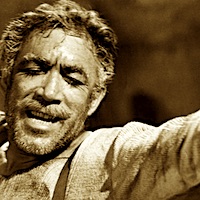
Georgios Zorbas Γεώργιoς Ζορμπάς (Alexis Zorba)
1865 – 1941 CE
"Zorba the Greek"
The Greek miner Nikos Kazantzakis befriended, admired, and used as the inspiration for his book, Zorba the Greek; Georgios Zorbas grew up as the son of a wealthy sheep farmer. He tended flocks, worked in the fields, cut wood for people, and became a miner. He eloped with his boss' daughter who had 8 children with him before tragically dying. He then decided to become a monk on Mount Athos where he met Kazantzakis and began a partnership to develop a mine together. His great-grandson, Pavlos Sidiropoulos, became a famous rock star who founded the band, Spiridoula and produced an record considered the greatest Greek rock album of all time.
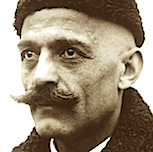
G. I. Gurdjieff
1866 – 1949 CE
Philosopher, mystic, composer, ragged wanderer, successful entrepreneur, and deep spiritual teacher; Gurdjieff emphasized the hypnotic, dull, and asleep quality of our lives and - like the Buddha and many others - that we can “wake up.” His intense curiosity led him on extensive travels through Tibet, Russia, India, Iran, Egypt, North America and throughout Central Asia in a search for "seekers of truth,” people like we include on these lists. He felt that our religious and philosophical traditions have migrated from understanding the “sense” to mindless belief and adherence to the forms, to only the “words.” He sought to revitalize ancient wisdom traditions (Socratic, Stoic, Vedic, Buddhist) making them alive and relevant to contemporary life. His popular teachings on the enneagram remain influential today.
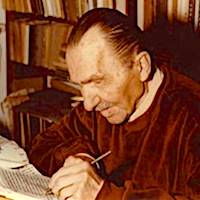
Nikos Kazantzakis
1883 – 1957 CE
Fearless philosopher, poet, translator, prolific writer, and spiritual alchemist; Kazantzakis was condemned by the Catholic Church and the Orthodox Church wouldn’t even let him be buried in a cemetery. He followed in the Zen/Taoist tradition of synthesizing opposites and reconciled Buddhism and Christianity, philosophy and politics, sensuality and a spiritual path. An extensive traveler in both the east and west, he was given the International Peace Award and made great contributions to culture beyond nationalism, religion, and sectarian view.

Heleni Kazantzakis
1903 – 2004 CE
Orphaned at 15, Heleni Samiou met—and fell in love with—Nikos Kazantzakis when she was 21 and he was 41. They lived together for 20 years before marrying in 1945. Although writing several books herself and even winning literary awards, she mainly dedicated herself to supporting her husband's writing career by transcribing his manuscripts. For example, using only a small typewriter, she typed and re-typed his 33,330 verse epic poem, The Odyssey, seven times. Many of her suggestions and ideas became integral parts of his work. After Nikos died, Heleni moved to Geneva where she created a welcoming environment for literary circles, Kazantzakis fans, and Greek freedom fighters. She was persecuted by the Greek military dictatorship, captured as a prisoner of war by Turkish soldiers, and escaped with the aid of British helicopters. She donated the profits from Nikos' books as relief aid to the families of political prisoners after the Turkish invasion of Cyprus in 1974.
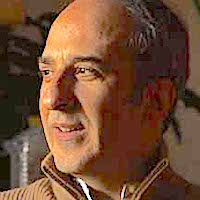
Peter Kingsley
1953 CE –
Sufi, mystic, author, philosopher, scholar; Kingsley describes a "flowering of consciousness” and the birth/beginning of western civilization during the pre-Socratic Greek period based on the influence of Parmenides and Empedocles. He describes Parmenides' nameless goddess who uses words as esoteric seeds and paradoxical divine logic to reveal unity and reality’s oneness. These seminal Orphic and Pythagorean views later distorted by Plato and Aristotle show remarkable similarities to early Buddhist, Taoist, and shamanistic traditions; modern Vedanta, Zen, and Dzogchen.
Related Sources (15 sources)
On Nature (Fragments) by Heraclitus
Golden Verses of Pythagoras Χρύσεα by Pythagorus
Report to Greco by Nikos Kazantzakis
A Story Waiting to Pierce You by Peter Kingsley
Aesop's Fables, the Aesopica by Aesop
Quotes about the Greek Lineage (16 quotes)

“We are a free democracy, but we are obedient. We obey the laws, especially those which protect the oppressed. We do not allow absorption in our own affairs to interfere with participation in the city's. We differ from other states in regarding the man who holds aloof from public life as useless, yet we yield to none in independence of spirit and complete self-reliance.”
Comments: Click to comment
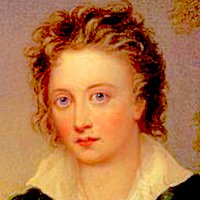
“We are all Greeks. Our laws, our literature, our religion, our arts, have their root in Greece.”
Comments: Click to comment

“The struggle between liberty and authority is the most conspicuous feature in the history of... Greece, Rome, and England.”
Comments: Click to comment
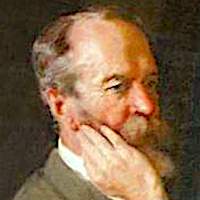
“Greek history is a panorama of war for war's sake... the utter ruin of a civilization which in intellectual respects was perhaps the highest the earth has ever seen. The wars were purely piratical. Pride, gold, women, slaves, excitement, were their only motives.”
Comments: Click to comment
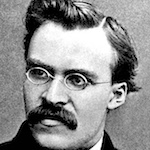
“The Greek philosophers went through life feeling secretly that there were far more slaves than one might think—meaning that everybody who was not a philosopher was a slave. Their pride overflowed at the thought that even the most powerful men on earth belong among their slaves.”
Comments: Click to comment
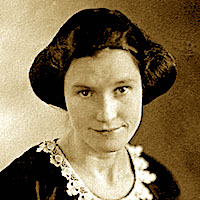
“The creed of democracy—spiritual and political liberty for all—and each man a willing servant of the the state, was the conception which underlay the highest reach of Greek genius. It was fatally weakened by the race for money and power, war destroyed it, and Greece lost it forever. Nevertheless, the ideal of free individuals unified by a spontaneous service to the common life was left as a possession to the world, never to be forgotten.”
Comments: Click to comment

“To rejoice in life, to find the world beautiful and delightful to live in, was a mark of the Greek spirit, which distinguished it from all that had gone before. It is a vital distinction.”
Comments: Click to comment

“It is to the Greeks that we owe ways of thinking and investigating that have ever since been found fruitful... by the sixth century BCE some of them achieved a degree of enlightened rationalism which cannot be surpassed in the present day.”
Comments: Click to comment

“Almost all the hypotheses that have dominated modern philosophy were first thought of by the Greeks… they gave birth to theories that have had an independent life and though at first infantile, have proved capable of serving and developing though more than 2000 years; their imaginative inventiveness in abstract matters can hardly be too highly praised.”
Comments: Click to comment

“The close connection between virtue and knowledge is characteristic of Socrates and Plato, in all Greek thought, as opposed to that of Christianity. In Christian ethics, a pure heart is essential, and is at least as likely to found among the ignorant as among the learned. This difference between Greek and Christian ethics has persisted down to the present day.”
Comments: Click to comment

“The Greek air is truly holy, I thought to myself; surely freedom was born here... Norway's struggle had become this Greek shepherd's struggle, because liberty, for him, was like his own daughter.”
Comments: Click to comment
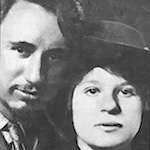
“By the time of Plato's death, his hostile analysis of Athenian democracy was approaching apparent confirmation by history... the gap between rich and poor widened... the rich organized themselves for protection against the poor... debtors massacred their creditors en masse... the middle classes, as well as the rich began to distrust democracy as empowered envy and the poor distrusted it as a sham... the class war left Greece internally as well as internationally divided”
Comments: Click to comment
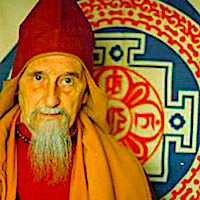
“The Egyptians lost themselves in trying to preserve the bodily form, the Greeks in trying to capture the beauty of the human body, the pre-Columbian Americans, by establishing cosmic laws over human considerations, Christianity and Islam—the daughters of Jewish monotheism—by overpowering the human mind through dictatorship of a a partially world-creating and at the same time world-negating spirit.”
Comments: Click to comment

“When the Greeks identified the planets with certain gods, they projected into the sky qualities of their own psychic experience, symbolized in the images of their gods. This was a genuine procedure, derived from an inner reality. But if we imitate this symbolism, while knowing that, for instance, Venus is a hell of boiling mud and poisonous gases... it is ridiculous to associate it with qualities of love.”
Comments: Click to comment
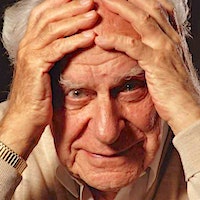
“In the war between Athenian democracy and the 'arrested oligarchic tribalism of Sparta', we must never forget Thucydides's 'involuntary bias', and that 'his heart was not with Athens, his native city.'”
Comments: Click to comment
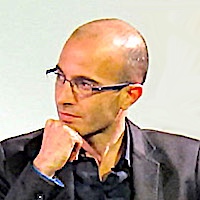
“The Greeks did not waste any sacrifices on Fate, and Hindus built no temples to Atman... The fundamental insight of polytheism is that the supreme power governing the world is unconcerned with the mundane desires, cares, and worries of humans.”
Comments: Click to comment
Comments (0)